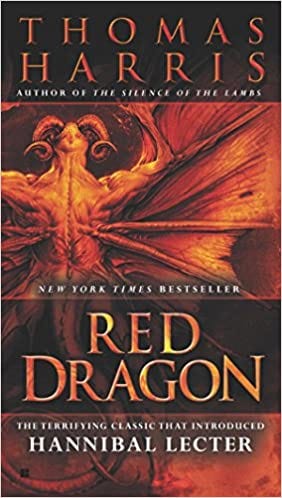“(Dear God, the children are so small.)”
The trouble with most people who write about serial killers is that they seem to enjoy it. There comes a point in many a James Patterson or a John Sandford novel (the victim being bound in a basement, her cries muffled with a strip of duct tape) when I back queasily away; the fever of the killer has infected the suddenly frothing prose. With violence as with sex scenes: you don’t, as a reader, want to feel that you’ve interrupted the writer at his keyboard in a private moment.
One of the few writers about serial killers who does so with the proper degree of sobriety — who restores a little dignity to the deeply undignified enterprise — is Thomas Harris. (I should specify: pre-Hannibal Thomas Harris. Even Homer nods; even Harris froths.) Red Dragon in particular is the scariest book I’ve ever read. And it’s terrifying precisely because it treats its victims with a measure of respect. You don’t, it turns out, raise the hairs on the reader’s neck by laying the evil on ever-thicker (Saw XIV: Now with 50% More Dismemberment). You do so by lavishing attention on those who fall into evil’s path.
In Red Dragon that means the Leeds family. Will Graham — former FBI agent and serial-killer-apprehension savant — has come to Atlanta to tour the Leeds’ bloodstained home. Harris sets the scene with characteristic economy and insight.
“A few neighbors drove by, looking at the house quickly and looking away. A murder house is ugly to the neighbors, like the face of someone who betrayed them. Only outsiders and children stare.”
Graham wanders through the house, noting the means of entry, horrified, as ever, by his instinctual understanding of a murderer.
“… shocked at his associations, appalled at his dreams; sorry that in the bone arena of his skull there were no forts for what he loved.”
This is all graceful and tense, more subtly harrowing than what you typically find on a paperback rack, but look what Harris does when, a bit later, Graham comes upon the diary of the dead Mrs. Leeds’s.
“Graham sat on a spindly white chair and opened the diary at random:
December 23rd Mama’s house. The children are still asleep. When Mama glassed in the sun porch, I hated the way it changed the looks of the house, but it’s very pleasant…
Mrs. Leeds — and Harris — go on like this, believably but non-cloyingly mundane. And then:
“Graham read on as the light faded, through the daughter’s tonsillectomy, and a scare in June when Mrs. Leeds found a small lump in her breast. (Dear God, the children are so small.)
“Three pages later the lump was a small benign cyst, easily removed.”
This, for me, is the moment when Mrs. Leeds comes to life — which is to say, the moment when she truly dies. Dear God, the children are so small. This is the authentic voice of late-night parental anguish. This is the sound of a woman inspecting from all angles what she fears will become the consuming disaster of her life. (And the parentheses — the punctuation marks themselves — are character-revealing, and the character they reveal is Graham’s: exacting, wishing to avert his eyes.)
And then the reprieve! The glorious, heart-un-clenching arrival of good test results: small, benign, easily removed. Harris doesn’t dwell on, or even mention, the obvious irony: that Mrs. Leeds will be killed, not by a tumor but by a psychopath, within a month. He leaves the reader to tie that knot, knowing it will squeeze all the tighter.
Then Graham is off, to consult with medical examiners, to reassure his wife that he’ll be done with the case soon. Rest assured: Harris does, in Red Dragon, deliver the full bill of goods — the forensics, the psychological profiles, the frantic phone calls from the FBI.
But these pleasures don’t — since Harris has taken the trouble to furnish his victims with inner lives — bring in their wake the greasy sense of having been engaged in something disreputable. Thanks to Mrs. Leeds and her diary, we come away from the book the way we should come away from any close encounter with death. We feel chastened, and vulnerable, and grateful for our brief safety.



